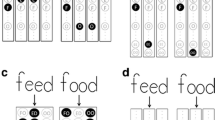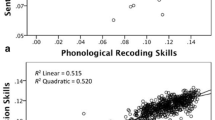Abstract
Neuropsychological models postulate that the memory representation acquired for use in reading words is separate from the one acquired for use in spelling, while developmental models assume that the same representation is developed for access in both reading and spelling. The dual-representation model contends that there is often more precise information in reading representations than in spelling representations. This claim was tested in the current study using adult native speakers of English. People were supplied with minimal visual feedback while they spelled words that they knew and could read, and were then shown their whole spelling and asked whether they could improve upon it. People detected spelling mistakes on fewer than one in six trials after the reading check. They also returned many spellings to the original form, and were unable to improve upon them any more often than to change them to something equally bad or worse. The findings favour the view that normal individuals acquire a single orthographic representation from repeated exposures to a word during both reading and spelling. The representation may be adequate to permit successful reading but be insufficient for reproduction of the word-specific knowledge required for accurate spelling.
Similar content being viewed by others
References
Baddeley A. (1986). Working memory. Clarenson Press, Oxford.
C. Barry (1994) Spelling routes (or roots or rutes) G.D.A. Brown N.C. Ellis (Eds) Handbook of spelling: Theory, process and intervention Wiley Chichester 27–49
C. Barry P. Bastiani Particlede (1997) ArticleTitleLexical priming of nonword spelling in the regular orthography of Italian Reading and Writing: An Interdisciplinary Journal 9 499–517 Occurrence Handle10.1023/A:1007907431371
A.M.T. Bosman G.C. Van Orden (1997) Why spelling is more difficult than reading C.A. Perfetti L. Rieben M. Fayol (Eds) Learning to spell: Research, theory, and practice across languages Erlbaum Mahwah, NJ 173–194
V. Burden (1992) Why are some ‘normal’ readers such poor spellers? C.M. Sterling C. Robson (Eds) Psychology, spelling and education. Multilingual Matters Clevedon UK 200–214
R. Campbell (1987) ArticleTitleOne or two lexicons for reading and writing words: Can misspellings shed any light? Cognitive Neuropsychology 4 487–499
A Caramazza G Miceli G. Villa C. Romani (1987) ArticleTitleThe role of the graphemic buffer in spelling: Evidence from a case of acquired dysgraphia Cognition 26 59–85 Occurrence Handle10.1016/0010-0277(87)90014-X Occurrence Handle3608396
A.E. Castles V.M. Holmes M. Wong (1997) ArticleTitleVariations in spelling style among lexical and sublexical readers Journal of Experimental Child Psychology 64 98–118 Occurrence Handle10.1006/jecp.1996.2339
M. Coltheart (1978) Lexical access in simple reading tasks G. Underwood (Eds) Strategies of information processing Academic Press London 151–216
M Coltheart K Rastle C Perry J. Ziegler R. Langdon (2001) Psychological Review 108 204–256 Occurrence Handle11212628
A. Content (1991) ArticleTitleThe effect of spelling-to-sound regularity on naming in French Psychological Research 53 3–12 Occurrence Handle10.1007/BF00867327
L.C. Ehri (1980) The development of orthographic images U. Frith (Eds) Cognitive processes in spelling Academic Press London 311–338
L.C. Ehri (1986) ArticleTitleSources of difficulty in learning to spell and read Advances in Developmental and Behavioral Pediatrics 7 121–195
L.C. Ehri (1991) Development of the ability to read words R. Barr M.L. Kamil P. Mosenthal P.D. Pearson (Eds) Handbook of reading research, Vol. 2 Longman New York 385–419
A.W. Ellis (1993) Reading, writing and dyslexia: A cognitive analysis Erlbaum Hove, UK
U. Frith (1980) Unexpected spelling problems U. Frith (Eds) Cognitive processes in spelling Academic Press London 495–515
U. Frith (1984) Specific spelling problems R.N. Malatesha H.A. Whitaker (Eds) Dyslexia: A global issue Martinus Nijhoff The Hague 83–103
U. Frith (1985) Beneath the surface of developmental dyslexia K. Patterson J. Marshall M. Coltheart (Eds) Surface dyslexia: Neuropsychological and cognitive studies of phonological reading Erlbaum London 301–330
E. Funnell (1992) On recognising misspelled words C.M. Sterling C. Robson (Eds) Psychology, spelling and education. Multilingual Matters Clevedon UK 87–99
J.R. Hanley J. Kay (1992) ArticleTitleDoes letter-by-letter reading involve the spelling system? Neuropsychologia 30 237–256 Occurrence Handle10.1016/0028-3932(92)90003-5 Occurrence Handle1574160
V.M. Holmes J. Carruthers (1998) ArticleTitleThe relation between reading and spelling in skilled adult readers Journal of Memory and Language 39 264–289 Occurrence Handle10.1006/jmla.1998.2583
V.M. Holmes A.E. Castles (2001) ArticleTitleUnexpectedly poor spelling in university students Scientific Studies in Reading 5 319–350 Occurrence Handle10.1207/S1532799XSSR0504_02
V.M. Holmes C.W. Davis (2002) ArticleTitleOrthographic representation and spelling knowledge Language and Cognitive Processes 17 345–370
G Houghton D.W. Glasspool T. Shallice (1994) Spelling and serial recall: Insights from a competitive queueing model G.D.A. Brown N.C. Ellis (Eds) Handbook of spelling: Theory, process and intervention Wiley Chichester 365–404
A.F. Jorm C. Schoknecht (1981) ArticleTitleThe role of visual word-recognition checks in children’s spelling Australian Journal of Psychology 33 393–403
F. Kaminska (2003) ArticleTitleLittle Frog and Toad: Interaction of orthography and phonology in Polish spelling Reading and Writing: An Interdisciplinary Journal 16 61–80 Occurrence Handle10.1023/A:1021746122724
H. Kučera W.N. Francis (1967) Computational analysis of present-day American English Brown University Press Providence, RI
P.A. McMullen A. Braithwaite J.M. McGlone (1998) ArticleTitleSeparate orthographic input and output lexicons: Evidence from a surface dysgraphic Brain and Cognition 37 108–109
J. Morton (1969) ArticleTitleInteraction of information in word recognition Psychological Review 76 165–178
J. Morton (1980) The logogen model and orthographic structure U. Frith (Eds) Cognitive processes in spelling Academic Press London 117–133
K. Patterson (1986) ArticleTitleLexical but nonsemantic spelling? Cognitive Neuropsychology 3 341–367
C.A. Perfetti (1991) Representations and awareness in the acquisition of reading competence L. Rieben C.A. Perfetti (Eds) Learning to read: Basic research and its implications Erlbaum Hillsdale, NJ 33–44
C.A. Perfetti (1997) The psycholinguistics of reading and spelling C.A. Perfetti L. Rieben M. Fayol (Eds) Learning to spell: Research, theory, and practice across languages Erlbaum Mahwah, NJ 21–38
C. Perry J.C. Ziegler (2004) ArticleTitleBeyond the two-strategy model of skilled spelling: Effects of consistency, grain size, and orthographic redundancy Quarterly Journal of Experimental Psychology 57A 325–356
C Perry J.C. Ziegler M. Coltheart (2002) ArticleTitleHow predictable is spelling? Developing and testing metrics of phoneme-grapheme contingency Quarterly Journal of Experimental Psychology 55A 897–915
D.C. Plaut J.L. McLelland M.S. Seidenberg K. Patterson (1996) ArticleTitleUnderstanding normal and impaired word reading: Computational principles in quasi-regular domains Psychological Review 103 56–115 Occurrence Handle10.1037//0033-295X.103.1.56 Occurrence Handle8650300
M.S. Seidenberg G.S. Waters M.A. Barnes M.K. Tanenhaus (1984) ArticleTitleWhen does irregular spelling or pronunciation influence word recognition? Journal of Verbal Learning and Verbal Behavior 23 383–404 Occurrence Handle10.1016/S0022-5371(84)90270-6
G.O. Stone M.D. Vanhoy G.C. Van Orden (1997) ArticleTitlePerception is a two-way street: Feedforward and feedback phonology in visual word recognition Journal of Memory and Language 36 337–359 Occurrence Handle10.1006/jmla.1996.2487
Y.J. Tenney (1980) Visual factors in spelling U. Frith (Eds) Cognitive processes in spelling Academic Press London 215–230
R. Treiman D. Bourassa (2000) ArticleTitleChildren’s written and oral spelling Applied Psycholinguistics 21 183–204 Occurrence Handle10.1017/S0142716400002022
G.C. Orden ParticleVan S.D. Goldinger (1994) ArticleTitleInterdependence of form and function in cognitive systems explains perception of printed words Journal of Experimental Psychology: Human Perception and Performance 20 1269–1291 Occurrence Handle10.1037//0096-1523.20.6.1269
G.C. Orden ParticleVan B.F. Pennington G.O. Stone (1990) ArticleTitleWord identification in reading and the promise of subsymbolic psycholinguistics Psychological Review 97 488–522 Occurrence Handle10.1037//0033-295X.97.4.488 Occurrence Handle2247539
J.C. Ziegler M. Montant A.M. Jacobs (1997) ArticleTitleThe feedback consistency effect in lexical decision and naming Journal of Memory and Language 37 533–554 Occurrence Handle10.1006/jmla.1997.2525
Author information
Authors and Affiliations
Corresponding author
Rights and permissions
About this article
Cite this article
Holmes, V.M., Babauta, M.L. Single or Dual Representations for Reading and Spelling?. Read Writ 18, 257–280 (2005). https://doi.org/10.1007/s11145-004-8129-5
Issue Date:
DOI: https://doi.org/10.1007/s11145-004-8129-5




